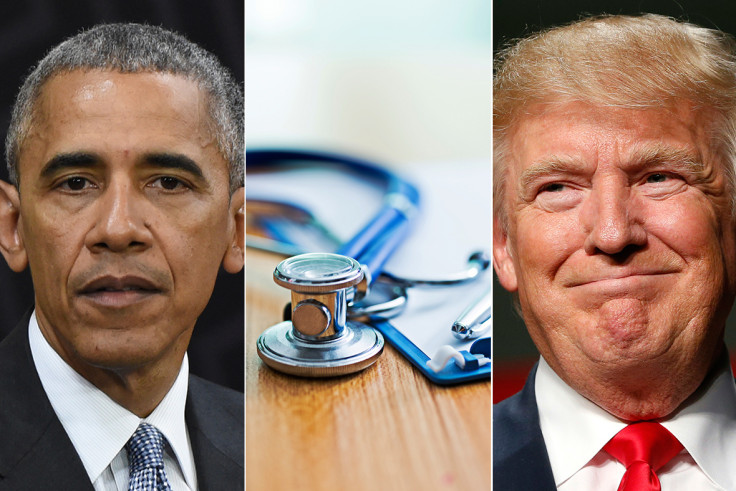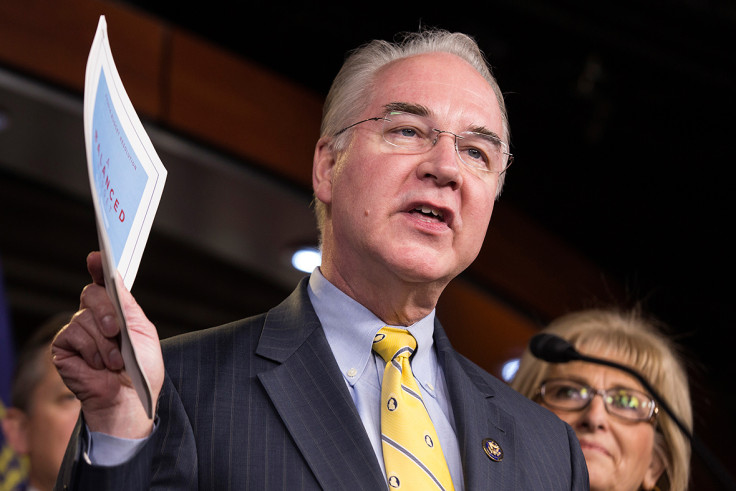Obamacare: What will happen to the Affordable Care Act under Donald Trump?
IBTimes UK takes a look at what the future might look like for Obamacare when Trump takes office.
The Patient Protection and Affordable Care Act, more commonly known as Obamacare, is one of the most important and heatedly debated pieces of legislation passed during Barack Obama's presidency. It was signed into law in March 2010 and upheld by the Supreme Court two years later.
Throughout his campaign, Donald Trump warned that Obamacare would be repealed in his first 100 days in office if he was elected president. However, after meeting with President Obama following his victory, the president-elect has announced that some key provisions of the law could be kept.
Ever since it was enacted, the Affordable Care Act has been criticised by the Republicans, who have called for a cheaper and less prescriptive system to be established.
On 4 January 2017, Republicans in the Senate have taken the first step to dismantle the law that came to define Obama's presidency on the domestic front. They voted by 51 to 48 to debate a budget resolution which would stop some of the programme's key provisions from being funded.
However, the GOP has so far failed to come up with any comprehensive replacement plan. The future of Obamacare is uncertain and there is no consensus among Republicans about how it should be replaced to ensure that millions of people don't lose coverage.
Is it necessary to enrol for 2017 given Trump's election?
In 2016, roughly 20 million Americans were enrolled on Obamacare and the uninsured rate stood at an all-time low of 11.9%, for adults aged 18 to 64.
Recent figures released by Public Health officials suggest that 6.4 million Americans had enrolled through the public marketplace, signing up for 1 January 2017.

However, only 2.1 million are new customers, down from 2.4 million last year at the same period. There are concerns that some people may be delaying enrolment, given Trump's promise to repeal the law.
To date, Obamacare is still the law in place in the US and Americans still need to unroll, get an exemption or otherwise pay a fee as required by a provision of the law known as the 'individual mandate'. Enrolling in one of the health insurance plans this year would guarantee coverage through the end of the year, as insurers are bound to respect the contracts signed with individuals until 2017 ends.
So even though the law might change radically after 2017, enrolling means that people would have their health insurance coverage for one more year at least. What is not yet clear is how some of the changes to the law that may take place in 2017 will affect them.
How do Republicans plan to repeal Obamacare?
It is very unlikely that a plan to replace and repeal Obamacare will be enacted in the first 100 days of Trump's presidency, as this is likely going to be a long and complex process. The Affordable Care Act and its provisions are described in a lengthy document of about a thousand pages. Some provisions that are already enacted, and could prove nearly impossible to remove.
The most likely scenario discussed for sometime now is that Republicans in Congress would repeal some parts of the law in early 2017 via a process known as 'budget reconciliation'. This was certainly the aim of the recent Republican vote in the Senate.
However, Republicans might then wait until after 2018, when the mid-term elections are due, to come up with a replacement plan.
Budget reconciliation involves repealing some of the Act's provisions that require funding, by taking them out of the budget, while the rest of the law stands.

However, taking out some of these measures could already have a negative impact on people's health coverage as early as this year, although it is not clear how long the whole 'budget reconciliation' process would take.
So what changes are expected in 2017?
Using budget reconciliation, provisions such as cost assistance could be repealed; these tax subsidies are available through the marketplace and given out based on income to help people pay their insurance costs despite important premium increases this year. Under Donald Trump, the subsidies could potentially be replaced by the ability to fully deduct health insurance premiums from taxes.
Experts also believe that the expansion of Medicaid could be compromised when the Republicans enter the White House.
The Republicans could also rapidly repeal two of the most contentious aspects of Obamacare. The mandatory nature of Obamacare was enforced by the individual mandate and this provision is expected to go quickly. This means that people would not have to pay a fee anymore if they don't get coverage.
The employer mandate, that is the requirement for businesses with 50 full-time employees or more to provide insurance to at least 95% of said employees, could also disappear.
There had been concerns that provisions banning discrimination of people with preexisting health conditions and allowing them to get coverage could be repealed, but the president-elect has announced that he wanted to keep this protection in place, as well as the right for children under the age of 26 to stay on their parents' insurance plan.
Are there risks to repealing Obamacare?
Repealing the law or even only some aspects could have major economic and social consequences if a solid replacement plan is not agreed on rapidly – and so far there seems to be little consensus among Republicans, as economist Paul Krugman explains in The New York Times.
If mandates, subsidies and Medicaid expansion go in 2017, significant market disruptions are to be expected on the short term.
Insurance costs could go up if protections (like those for people with preexisting conditions) are kept but mandates and subsidies that keep the system affordable for Americans are repealed. The idea behind individual mandates was that even if someone refused to buy their own coverage, they'd still be buying into the risk pool that funded insurance for the people who needed it, so getting rid of it could weaken the whole system and make coverage much more expensive.

If subsidies disappear and Medicaid is not expanded, some people may become unable to pay their premiums. This means that they might lose their health coverage as early as 2017, while insurers could suffer important financial losses. A recent analysis by independent experts from the Urban Institute suggested that the number of uninsured Americans would rise from 28.9 to 58.7 million people by 2019 following a partial repeal of Obamacare.
Finally, without the individual mandate in place to reduce their risks, insurers might refuse to participate in the marketplaces where Americans buy their health coverage in 2018 if they don't receive financial support to offset the risks. This is an issue that the Trump administration would have to address in its first months in office.
© Copyright IBTimes 2025. All rights reserved.






















